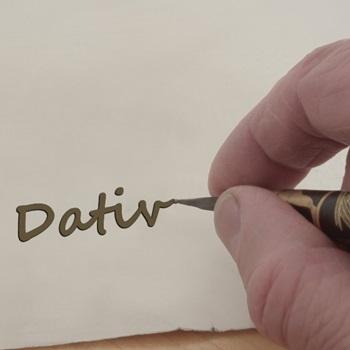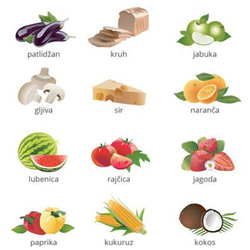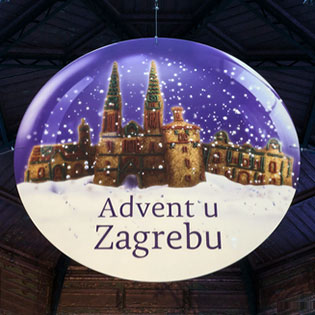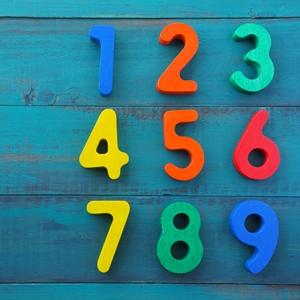The dative is most commonly used without prepositions as an indirect object, mostly describing to whom something is given or for whom something is done:
Marko je dao čokoladu mami → Marko gave a chocolate to his mom
Luka je kupio igračku sinu → Luka bought a toy for his son
Maja je poslala pismo prijateljima → Maja sent a letter to her friends
Regular noun endings in the dative case
| | |
Muški rod
(musculine)
| Ženski rod
(feminine) | Srednji rod
(neuter) |
|---|
Jednina
(singular) |
Nominative |
-
krevet (bed)
susjed (neighbour) |
-a
stolica (chair)
mačka (cat) |
-o/e
stablo (tree)
more (sea) |
| Dative |
-u
krevetu
susjedu |
-i
stolici
mački |
-u
stablu
moru |
Množina
(plural) |
Nominative |
-i
kreveti
susjedi |
-e
stolice
mačke |
-a
stabla
mora |
| Dative |
-ima
krevetima
susjedima |
-ama
stolicama
mačkama |
-ima
stablima
morima |
| |
|
|
|
|
When is the dative case used?
- veseliti se (to look forward to)
Veselim se Božiću. → I’m looking forward to Christmas.
- nadati se (to hope)
Nadam se dobrim vijestima.→ I’m hoping for good news.
- nedostajati (to miss)
Marku nedostaje Ana. → Marko misses Ana.
- sviđati se (to like)
Ivanu se sviđa život u Zagrebu. → Ivan likes the life in Zagreb.
With a few prepositions:
- k, ka (to)
Idemo k Ivanu. → We’re going to Ivan's.
Moram k zubaru. → I have to go to the dentist.
- nasuprot (across from)
Nasuprot bolnici se nalazi pekara. → Across from the hospital is a bakery.
Nasuprot kući je restoran. → Across from the house is a restaurant.
- usprkos, unatoč (despite)
Izašli smo unatoč kiši. → We went out despite the rain.
Došla je na posao usprkos bolesti. → She came to work despite the illness.
Assibilation in the dative case
Sibilarizacija (assibilation) is a sound change in Croatian whereby the consonants -k, -g and -h when placed before the vowel -i change into -c, -z and -s. This change can be seen in the singular form of feminine nouns and in the plural form of masculine nouns in the dative case.
Where can assibilation be found?
In feminine nouns in the singular form:
knjiga (book) → knjizi
ruka (hand) → ruci
noga (leg) → nozi
In masculine nouns in the plural form:
radnik (worker) → radnici (nominative plural) → radnicima (dative plural)
junak (hero) → junaci → junacima
orah (walnut) → orasi → orasima
There are a few exceptions to this rule
Hypocoristics (affectionate names) in the feminine gender:
baka (granny) → baki
seka (little sister) → seki
Nouns that end in -cka, -čka, -tka, -ga:
kocka (cube) → kocki
mačka (cat) → mački
patka (duck) → patki
Declination of the first names
Zrinka → Zrinki
Dubravka → Dubravki
Irregular nouns have different endings, so be careful about words like obitelj (family), ljubav (love) or noć (night). We are going to talk about this special group in a separate blog.
Exercise: how would you say the following in Croatian?
I'm writing a letter to my friend.
Answer
Pišem pismo prijatelju.
Ana bought a chocolate for Maja.
Answer
Ana je Maji kupila čokoladu.
I gave a book to my colleague.
Answer
Dao sam knjigu svojem kolegi.
Across from the school is the playground.
Answer
Nasuprot školi je igralište.
I promised my son we would travel together.
Answer
Obećao sam sinu da ćemo zajedno putovati.
Marko is helping the firefighters.
Answer
Marko pomaže vatrogascima.
The company is hoping for new workers.
Answer
Tvrtka se nada novim radnicima.
We went to the beach despite the rain.
Answer
Otišli smo na plažu unatoč kiši.
I am looking forward to my birthday.
Answer
Veselim se rođendanu.
My Dad bought me a gift.
Answer
Tata mi je kupio poklon.






